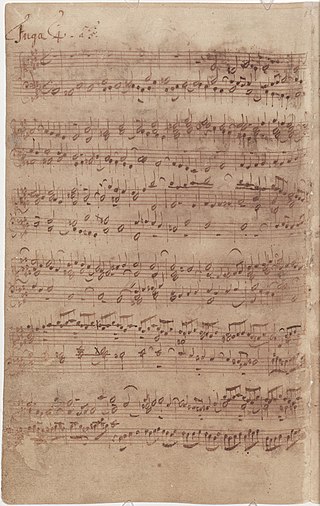The Bach-Werke-Verzeichnis is a catalogue of compositions by Johann Sebastian Bach. It was first published in 1950, edited by Wolfgang Schmieder. The catalogue's second edition appeared in 1990. An abbreviated version of that second edition, known as BWV2a, was published in 1998.

The 24 Preludes and Fugues, Op. 87 by Dmitri Shostakovich are a set of 24 musical pieces for solo piano, one in each of the major and minor keys of the chromatic scale. The cycle was composed in 1950 and 1951 while Shostakovich was in Moscow, and premiered by pianist Tatiana Nikolayeva in Leningrad in December 1952; it was published the same year. A complete performance takes approximately 2 hours and 32 minutes. It is one of several examples of music written in all major and/or minor keys.
Ariadne musica is a collection of organ music by Johann Caspar Ferdinand Fischer, first published in 1702. The main part of the collection is a cycle of 20 preludes and fugues in different keys, so Ariadne musica is considered an important precursor to Johann Sebastian Bach's The Well-Tempered Clavier, which has a similar structure.

The Well-Tempered Clavier, BWV 846–893, consists of two sets of preludes and fugues in all 24 major and minor keys for keyboard by Johann Sebastian Bach. In the composer's time, clavier, meaning keyboard, referred to a variety of instruments, most typically the harpsichord or clavichord, but not excluding the organ.

The Prelude and Fugue in C major, BWV 846, is a keyboard composition written by Johann Sebastian Bach. It is the first prelude and fugue in the first book of The Well-Tempered Clavier, a series of 48 preludes and fugues by the composer. An early version of the prelude, BWV 846A, is found in the Klavierbüchlein für Wilhelm Friedemann Bach.
The Prelude and Fugue in F minor, BWV 881, is a keyboard composition written by Johann Sebastian Bach. It is the twelfth prelude and fugue in the second book of The Well-Tempered Clavier, a series of 48 preludes and fugues by the composer.
Prelude and Fugue in C Minor, BWV 847, is a keyboard composition written by Johann Sebastian Bach. It is the second prelude and fugue in the first book of The Well-Tempered Clavier, a series of 48 preludes and fugues by the composer.
The Prelude and Fugue in G minor, BWV 861, is No. 16 in Johann Sebastian Bach's Well-Tempered Clavier Book I, keyboard music consisting of 24 preludes and fugues in every major and minor key.

The Prelude and Fugue in C-sharp minor, BWV 849, is a pair of keyboard compositions by Johann Sebastian Bach. It is the fourth prelude and fugue in the first book of The Well-Tempered Clavier, a series of 48 preludes and fugues by the composer.
Prelude and Fugue in C major, BWV 870, is a keyboard composition written by Johann Sebastian Bach. It is the first prelude and fugue in the second book of The Well-Tempered Clavier, a series of 48 preludes and fugues in every major and minor key.
Prelude and Fugue in C sharp Major, BWV 848, is a keyboard composition written by Johann Sebastian Bach. It is the third prelude and fugue in the first book of The Well-Tempered Clavier, a series of 48 preludes and fugues by the composer.
Prelude and Fugue in E minor, BWV 855, is the 10th prelude and fugue for keyboard (harpsichord) in the first book of The Well Tempered Clavier, composed in 1722 by Johann Sebastian Bach. The Prelude in E minor, BWV 855a, features as No. 18 ("Praeludium 5") in the 1720 Klavierbüchlein für Wilhelm Friedemann Bach. BWV 855a may also refer to both this Prelude and a Fughetta in the same key, an early version of BWV 855. Alexander Siloti made a piano arrangement in B minor of the Prelude BWV 855a.

Prelude and Fugue in B minor, BWV 893, is a keyboard composition by Johann Sebastian Bach. It is the 24th and final prelude and fugue in the second book of The Well-Tempered Clavier, a series of 48 preludes and fugues by the composer. It was composed in 1738.

The Prelude and Fugue in D minor, BWV 875 is a keyboard composition written by Johann Sebastian Bach. It is the sixth prelude and fugue in the second book of The Well-Tempered Clavier, a series of 48 preludes and fugues by the composer.
The Prelude and Fugue in B-flat minor, BWV 891, is a keyboard composition by Johann Sebastian Bach. It is the 22nd prelude and fugue in the second book of The Well-Tempered Clavier (WTC), a series of 48 preludes and fugues by the composer. It was composed in 1738.
The Prelude and Fugue in C minor, BWV 871, is a keyboard composition by Johann Sebastian Bach. It is the second prelude and fugue in the second book of The Well-Tempered Clavier, a series of 48 preludes and fugues by the composer. It was composed in 1738.

The Toccatas for Keyboard, BWV 910–916, are seven pieces for clavier written by Johann Sebastian Bach. Although the pieces were not originally organized into a collection by Bach himself, the pieces share many similarities, and are frequently grouped and performed together under a collective title.









